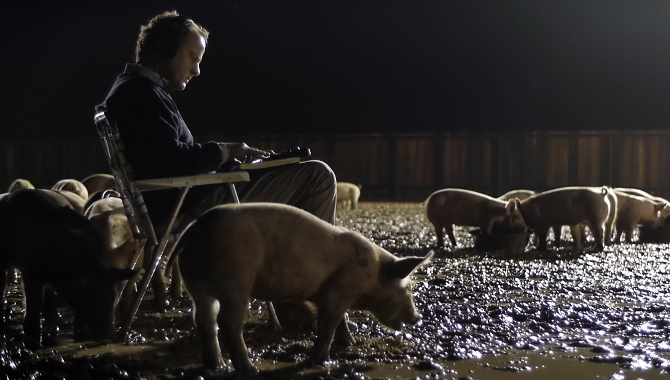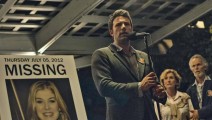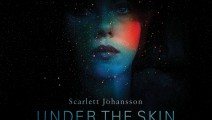film review: Upstream Colour (2013)
September 7, 2013 // No Comment
I thought I’d take a while before I reviewed Upstream Colour. It’s one that deserves a bit of time before you decide exactly what you want to make of it.
Upstream Colour is that latest film Shane Carruth, writer and director of 2004’s time travel puzzler Primer.
I was a huge advocate for Primer back in the day, I used to keep a copy of it in the car and lend it out to people who hadn’t seen it. I still would if I could remember who the last person I lent it to was… If you haven’t seen it, and you’re in any way interested in sci-fi, I highly recommend it.
It’s been 9 years since Carruth made the highly acclaimed Primer and things have changed for him. Undoubtedly there was a lot of pressure upon him to deliver a follow up. He had been working on a different film called A Topiary which was said to be a sci-fi epic however that stalled and he was recently quoted as saying it was “the thing I basically wasted my whole life on”.
Upstream Colour has arisen from the ashes of A Topiary and, I think can be seen as an evolution of Primer, in a weird sense. Not plot wise, or even thematically but it shows Carruth’s evolution as a film maker. These films were definitely made by the same person. Whether you approve of the evolution is a completely different matter though. Perhaps A Topiary would have been closer and maybe this film contains some reaction to that disappointment.
There isn’t much you can say about Upstream Colour without revealing what some would consider spoilers. Or rather what I would consider spoilers. So I’m just going to do a short review here and the rest of this post will be given over to discussion. I think.
Here’s the quick no-spoiler review of Upstream Colour. If you think you might like slow-moving, obtuse, dreamlike storytelling, rendered in beautiful, disorienting over-exposed colours, set to silence, punctuated by soft electro sounds… then by all means rush away from here and see it. It’s a both a curiosity to be observed and an experience to bathe in.
That’s my review. If you think that sounds good then you might like it. If not, you might hate it. Loving Primer have no bearing on whether you like Upstream Colour or not, but it might prepare you a little for it.
If you want my take on it, read on.
In many ways, it’s a very simple film. To recap, here’s what happens in Upstream Colour.
Structurally, it follows the life cycle of a parasitic worm. The first major character we meet, The Thief, harvests the parasite from flowers. He finds a victim (Kris) and infects her with the worm. The worm causes the victim to be extremely suggestible and he uses this trait to get her to empty their bank accounts and give him all her money – something he has seemingly done before. Once he’s got what he wants, he abandons her.
Later, a pig farmer (known as The Sampler, from the credits) finds Kris, who seems to have been attracted to him by a sound he plays in a field. It’s not clear as to whether this was his intention… but again it seems this has happened before with other victims. He removes the worm, puts it into one of his pigs and sends Kris on her merry way.
Somehow, this transplantation of the worm into the pig creates a bond between Kris and the pig… You’ve seen the film right? So you know I’m not making this up. Meanwhile, Kris finds out her life has been ruined and sets about rebuilding. While she’s doing this she meets Jeff who turns out to have been another victim, though neither of them know it.. They are either attracted to each other and cause their pigs to be attracted to each other… or the other way around, it’s really not that clear. I guess it’s not meant to be. It’s not that type of film.
Anyway. Eventually, Kris’s pig becomes pregnant. Which greatly dismays the pig farmer (and Kris) and he decides to drown them in the river. As the pigs decompose, they expel a spore like substance which infects some nearby orchids, turning them blue. Orchid Harvesters then collect the orchids to be sold on to The Thief.
It’s not that complicated really. No more than Primer was really. It’s the presentation that beggars belief. The question for me is… why? Why am I watching this film?
There is no doubt in my mind that Shane Carruth is a talented film-maker. And he’s only made two films so it hardly seems to be fair to damn him yet… but Upstream Colour… I can only appreciate as a piece of art. I don’t see the entertainment in this. And more than that I don’t see a message. I don’t see a theme, or an exploration of an idea.
Perhaps this does stem from his background as a software engineer and mathematician. It seems disingenuous to me pigeonhole someone because of what they studied or what they do. After all, my degree is in Economics and I work in Advertising, but then perhaps that does say more about me than I think it does. Who knows.
When I look at Carruth’s (two) films, I see a person who creates situations which hermetically sealed. Like a mathematical problem, or piece of software, they’re created for a distinct purpose. We’re looking at closed loops. From his interviews on the film, he seems to saying that it’s an exploration of how a person identity is constructed. But if it is, he spends as much time on “why” the reconstruction is needed as on the “how”. His interest in the technicalities around delivering the “why” (i.e. the story of the worm) hamstring his ability to also formulate a compelling relationship between the viewer and the central characters.
I know that we’re supposed to be watching a romance between Jeff and Kris, the twist being that it’s a romance that’s not entirely in their control. However, I’m not invested in this romance. It’s a flawed proposition, if they have no control over themselves then their emotions are false and they have no way to properly relate. They will always be at a distance. And as an audience, we’re going to see that distance and keep it ourselves. Why would we care about characters who aren’t sure if they care about themselves?
If we can’t relate to the core relationship, we’re left to unravel the puzzle. This is where the whole film feels, to me, like a technical exercise. Carruth seems to have an obsession with deconstruction. He takes a narrative, deconstructs the narrative elements, then reassembles them into a new order in a film. But I have to wonder as to what end. No doubt he’s created something beautiful but I don’t know if the effort required to appreciate that beauty and to reconstruct his concept is warranted by the payoff.
And I’m also not convinced that he, in his reassembly, actually manages to create the film he thinks he has. It was the same with Primer. Can you really piece all the parts together and see what he meant by it? Or do you have to take a leap of faith and assume that “this is what he must have meant”. And if he is leaving space for interpretation, why is he doing it in films that are so rigidly constructed?
It puts me in mind of… say creating a person. I’m sure that, if not now then in the future, we will be able to grow all the component parts of a human… but that’s not the same as creating a living breathing person.
Shane Carruth has produced what, on the outside, has all the trappings of great film-making… I’m just not convinced he’s worked out how to bring his films to life.
6.5/10







No Comments